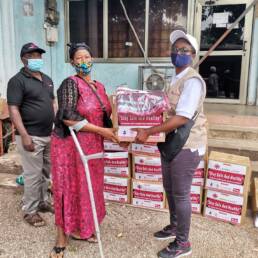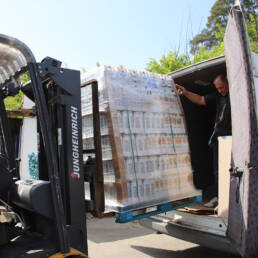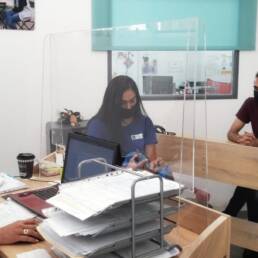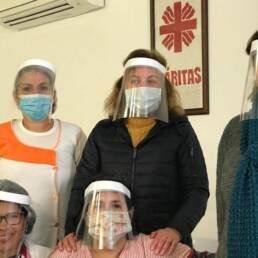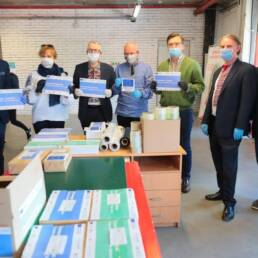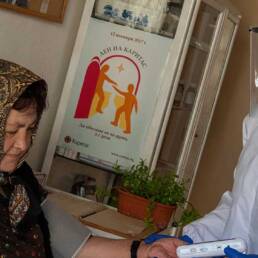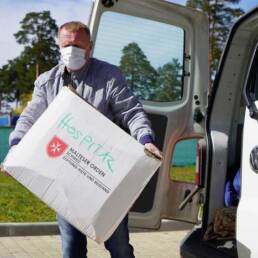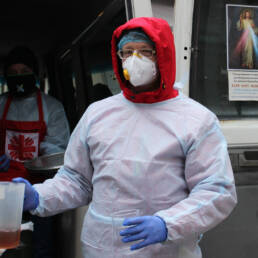Author
Caritas Luxembourg
Tel: +352 40 21 31 200
caritas@caritas.lu
http://www.caritas.lu
Unofficial translation
Not being an expert in health matters, Caritas Luxembourg confines itself to reflections on the social consequences of the COVID-19 health crisis.
Our criteria for formulating these reflections are:
- Before the crisis, Luxembourg was already a country with growing inequalities and frightening poverty situations, especially for families with children, single-parent families, foreigners and those with few qualifications. In addition, Luxembourg has the second largest population percentage of working poor in Europe.
- The crisis must, in no case, lead to worsening of these situations of inequality and poverty.
- The exit strategies from the crisis, and also all the policies for recovery after the crisis, must in no case be used again as a pretext, as during the crisis of 2008/2010 (or should we say 2008-2014 with regard to the famous ‘Zukunftspak’ intervention of 2014), to reduce the problems of public finances especially at the expense of the most vulnerable: the saying of ‘broad shoulders should shoulder more’ was, in the end, not followed by actions.
- There is a great danger that we will emerge from this crisis not only with an increased number of those living in poverty, but also a more extreme poverty of those who were already living from hand to mouth. The risk is of a worsening of existing inequalities which negate the gestures of solidarity shown during the crisis. Let us do everything not only to keep the spirit of solidarity, to live together and to support those close to us (also local producers and traders), but also to fundamentally rebuild our society on a basis of solidarity, instead of growth. And, of course, to achieve this without falling into the trap of populism and chauvinism, or nationalism and xenophobia.
It is important to say at the outset that we support the government’s emergency measures to stem the spread of the virus. Just like at the time of the 2008/2010 crisis, in case of an emergency, action must be taken, and in the event of a fire, firefighters must be called. We also agree with the need to carefully develop an exit or de-containment strategy, which is structured in stages.
However, we have certain remarks to make, regarding both the accompanying measures which were implemented at the start of the crisis, and with the concrete measures of de-containment now planned, which have started to be put into practice.
Reflections on the measures in detail
Partial unemployment: This measure has, above all, the merit of keeping workers in employment and, at least, partially guaranteeing their purchasing power. It must, however, be obvious that many households will find themselves far from 80% of their purchasing power, this can drop to only 60% or even less, in some cases, depending on the concrete situation of income composition (e.g. tips in certain professions, etc.) or fixed commitments (e.g. rents, mortgage loans and debts to be reimbursed, etc.).
Aid to companies: This aid, currently worth € 8.8 billion, is welcome and necessary. It must be widened over time, the criteria must be analysed in order not to leave people behind and, at the same time, it must become more targeted (it is no longer necessary for everyone to receive the same amount, especially if certain areas of the economy are opening up and therefore recovering sooner; an approach which is oriented towards real losses suffered is needed). At the same time, it must be targeted in the sense of protecting, above all, small traders, craftsmen, liberal and independent professions, including ‘start-ups’.
Resumption of economic activities: We can welcome a relaxation of confinement in stages towards an ‘exit’ strategy. However, it should not be forgotten that any relaxation carries with it the danger of an exponential resumption of infections. This is why we would have preferred the reopening of small shops, accompanied by appropriate measures (such as, for example, only allowing a limited number of customers to enter at the same time), rather than reopening the larger areas first, where the danger of crowds gathering is much higher.
‘Home schooling’: There does not seem to have been any alternative to closing schools and education and reception services (SEA). However, it is precisely the latter, as well as schools in general, which have undergone numerous reforms in recent years with the aim of improving equal opportunities for children. The closure seriously endangers this equality of opportunity. That is why its duration must be limited to an absolute minimum. And above all, it is not indicated whether subjects will be repeated rather than resuming the school program initially planned: the school curricula should not be erected as untouchable monuments. Subjects not taught this year may very well be picked up again later. Starting to teach new subjects during the home-schooling period will only make the most vulnerable fall behind their peers. However, ideas must now be proposed regarding specific measures to help these students. In addition, school is an important place for socialising, especially for children without siblings and those from disadvantaged families. The isolation of these children for weeks or months can have serious consequences for their mental state.
Resumption of schooling: Obviously, the reopening of schools (in stages) is welcomed. However, we feel it would have been better to leave the final year students in peace to prepare their exams without exposing them to the risk of being infected. It would have been much more effective to begin with the reopening of schools for younger children. On the one hand, the older ones are better able to study independently and, on the other, a recovery of missed lessons is more necessary for the lower grades as that is the age where education gaps begin to develop. Also, the argument that the older children will better handle wearing a mask than younger ones is weak, as younger children are not going to be any better at wearing masks in 4 weeks’ time.
‘Stay home’: This maxim, for lack of better alternatives, has unfortunately led to situations of isolation, psychological unhappiness, suicide attempts, an increase in domestic violence, the development of bad habits from a lack of daily structure, alcoholism and the abuse of other drugs. We should very quickly prepare an entire action plan to avoid this weighing down our families, and therefore society, for months or even years.
Protect vulnerable groups: We are especially reminded to protect the elderly and people already suffering from illnesses. It is an imperative! But let’s not forget that there are other vulnerable groups too, at this time, for whom we need to keep fighting for. Many women have been forced into working three jobs: maintaining the household as well as schooling children, and these challenges, which can sometimes be exacerbated by domestic violence, affect the children too. Students who depend on part-time jobs to supplement the funding of their studies are faced with the need to drop out of school due to the lack of such jobs. Students who are finishing their apprenticeships find themselves in front of a closed job market. Refugees who stay in welcome centres do not have the opportunity to isolate themselves socially, and for whom ‘home schooling’ of children is even more difficult than for others. Not to mention those refugees who are crammed into camps in Greece waiting for a safe route to open into Europe. This is also true of the centres recently opened to welcome a small number of unaccompanied minors from those camps in Luxembourg and in Germany. Let us also think of people who are in an irregular administrative situation. The current crisis affects them, like it does all the population, by complicating the whole process: a reduction/loss/or stopping of work without right to unemployment benefits (partial), no means to pay rent, no masks distributed because they are not registered in municipal registers, etc.
Nor should we forget that danger also hangs over the populations of many developing countries, where public health systems are totally lacking or in terrible condition. In addition, it is often the case that in these countries that no social insurance system is in place. In this crisis, employees become even more vulnerable since most of them live day to day and would not know how to get by if they lost their job. It is therefore necessary to put in place national legislation for a duty of vigilance, which would oblige companies to identify, in their value chain, the possible risks of human rights violations and environmental impact and to find ways to prevent them. Finally, the crisis should not be used as a pretext to reduce the amount of official development assistance, which should not stray far from 1% of GNI.
The imperative to continue protecting the environment: before the current health crisis, several initiatives had been taken in Luxembourg, in particular the consultation on the National Integrated Energy and Climate Plan (PNEC). Current and future measures to respond to the COVID-19 crisis must in no way dilute or delay the implementation of measures against climate change. On the contrary, many elements of the PNEC can turn out to be part of a real economic recovery program, such as energy renovations of the building stock.
Do not neglect the fight against poverty and inequality: on the contrary, the harmful effects of this crisis will require even more efforts to oppose these realities. If the provision of billions of euros to help people and businesses is possible, it must also be possible to plan for a few hundred million more that would be enough to banish poverty from our societies. Rethinking state aid Revis, living allowance expenses and housing subsidies to ensure that these measures lift their beneficiaries out of poverty and thereby contribute to less inequality and more equity.
Our solidarity in these times must be indomitable, both inside and outside of our families, neighbourhoods, villages, and countries.


